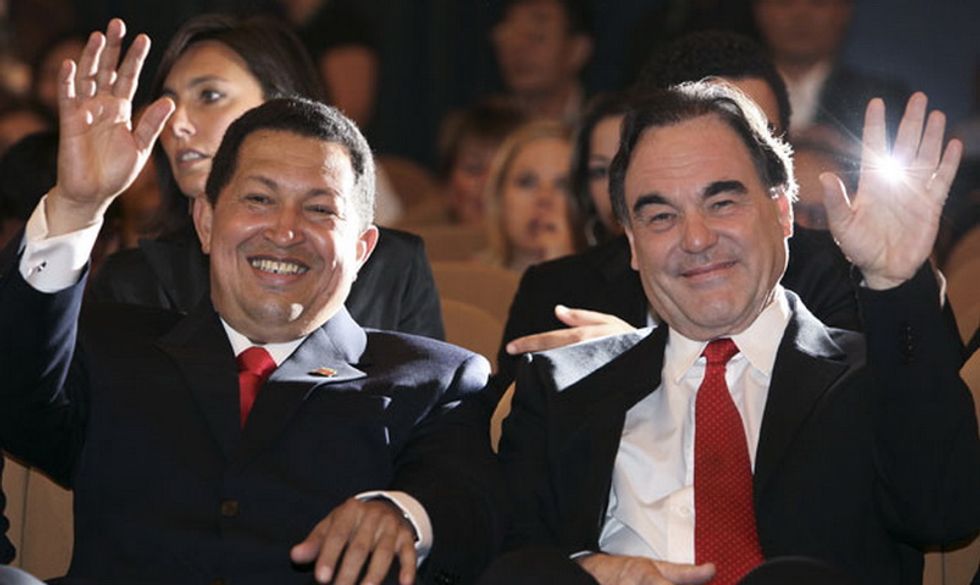The primary theme of Oliver Stone’s South of the Border, in which the JFK director checks his trademark paranoia at the door to interview South American heads of state including Venezuela’s Hugo Chávez, Argentina’s Cristina Fernández de Kirchner and Brazil’s Luiz Inácio Lula da Silva, is distrust of the U.S.-controlled International Monetary Fund. While only Chávez is openly contemptuous of Washington, none of those interviewed seem much interested in bending to America’s will.
Stopping short of endorsing Latin American socialism but never hiding his fondness for Cuba’s left-wing allies – particularly Chávez, whom he portrays as a man of the people, never broaching the touchy subject of Venezuela’s alleged human-rights violations – Stone lobs the softballs and watches them fly. He allows his subjects to dictate the flow of the conversation, and offers no challenges. Critics of liberal Hollywood will find no shortage of ammunition here.
That’s not to dismiss Border as sheer propaganda. The film is one-sided, but it’s a side rarely seen by U.S. audiences, most of whom get their news from sources including FOX, CNN and even The New York Times. (Stone skewers the lot.) Where else to find the likes of Chávez, Bolivia’s Evo Morales and Cuba’s Raúl Castro depicted as anything other than America-hating nut cases – and, in some cases, terrorist sympathizers?
What Stone finds instead are sensible hosts who recognize the benefits of a friendly relationship with North America and Europe but refuse to compromise their own interests to forge one. Ecuador’s Rafael Correa explains that he loves the U.S. – he earned an economics degree at the University of Illinois – but if he’s going to be branded a villain simply for requesting that America remove a military base from Ecuadorian soil, so be it. (When the Bush administration balked, he asked for an Ecuadorian base in Miami. No dice.)
Elsewhere, dissatisfaction with the IMF runs rampant. Based in Washington, the organization has 187 member nations and acts (to put it very simply) as a source of international credit. Yet Kirchner maintains that when Argentina tried to stop borrowing from the fund and repay its debts, the move was vigorously discouraged.
Stone spends the most time with Chávez, who takes the director aboard his personal jet. He insists that a failed coup against him was misrepresented by his country’s privately owned media. He is not a dictator, he says, citing the many elections he has held since rising to power in 1998. He calls President Bush a donkey, and, in a news clip taken from a 2006 visit to the UN, complains that it reeks of sulfur. (Stone includes footage of a hopeful meeting between Chávez and President Obama, though Chávez has recently suggested that Obama, too, smells sulfurous.)
All of this is very interesting, though it might have been helpful had Stone sought out some of the people Chávez and the others profess to champion. Are these leaders on the level? Are their claims of progress justified? Watching Border, it’s easy to accept these charismatic personalities at face value, so reasonable do they seem. But if there's another side to this story, Stone prefers not to present it; his chosen role is not devil's advocate.
EXTRAS: Bonus features include Changes in Venezuela, a mini-documentary about life under Chávez, a making-of featurette and revealing extended interviews with Stone's subjects.





















